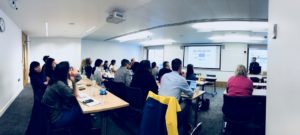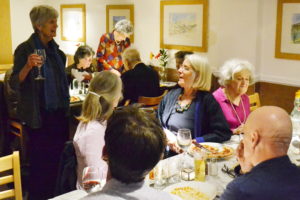Living Languages
The blog for the Institute of Modern Languages Research
The global expansion of Portuguese language, literature and music
Dr Shihan de Silva reports on the Global Portuguese symposium held at IMLR, Senate House, London in June 2018
On Monday 11 June 2018, the Institute of Modern Languages Research, School of Advanced Study, University of London, hosted a symposium on Global Portuguese in Senate House, Malet Street, London WC1E 7HU.
After opening remarks by Professor Catherine Davies (IMLR, School of Advanced Study), Dr Shihan de Silva (School of Advanced Study) set the scene for the afternoon in her introductory address. The aim of the symposium was to explore the global expansion of the Portuguese language, literature and music. The event was hugely successful drawing 46 participants, a mixture of senior academics, researchers, postgraduate students and members of the public. The symposium was timely given that the national day of Portugal was on 10th June and sentiments were high.
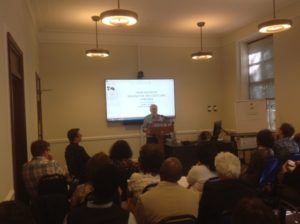
The papers moved from the Atlantic to the Indian Ocean. A joint paper by Dr Toby Green (King’s College London) and Dr Jose Ligna Nafafe (Bristol University) on ‘Lusotopian or Lusophone Atlantics? The Relevance of Transnational African Diasporas to the Question of Language and Culture’ was based on several years of research and their forthcoming book.
A lively presentation by Nadia Kerecuk (Creator & Convenor of the Brazilian Bilingual Book Club at the Embassy of Brazil & Historian of Ideas in Language Sciences) reminded the delegates of the research potential of this massive land mass. Her paper “Exceptional cross-fertilization cycles of the Portuguese language in Brazil” revealed a myriad of sources for further research, the indigenous peoples of Brazil to LIngua Gerao, and the evolution of Brazilian Portuguese.
Brazilian Portuguese stood in contrast to the writings of Mozambicans, through “From Nation to Imagination: Mia Couto and Language” by Professor David Brookshaw (Bristol University) who is the authority on Mia Couto’s works and has translated many of his books into English.
Professor Stefan Halikowski-Smith (Swansea University) spoke on Thailand – “Creolization and Diaspora in the Portuguese Indies. The Social World of Ayutthaya, 1640-1720”, bringing to the fore a little known part of the unofficial Portuguese empire. His presentation was well illustrated with pictures from his book on the topic.
This was complemented by Dr Shihan de Silva (School of Advanced Study) who spoke on “Hybridity in Postcolonial Music and Language in the Indian Ocean”. . A musical performance by Dr Marilyn Herman, Dr Hemal Jayasuriya, Mr Johan de Silva and Dr Shihan de Silva with guitar, drum, voice and piano crowned the event, not simply by livening up the afternoon but also by demonstrating cultural spillovers and the intangible heritage left by the Portuguese encounter.
Finally, participants joined the speakers in a Roundtable Discussion.
The event attracted media attention both in the UK and in Portugal. A Portuguese journalist reported on the forthcoming symposium and Dr Shihan de Silva was interviewed by a media consultant at Radio Televisao Portuguesa (RTP) who broadcast the interview on 11 June.
The contribution made by the Coffin Fund towards this Symposium is gratefully acknowledged.
Dr Shihan de Silva, School of Advanced Study
Dr Shihan de SIlva is a Senior Research Fellow at the Institute of Commonwealth Studies, School of Advanced Study, University of London and her research focuses on migration, commerce and cultural exchange in the Indian Ocean; the Malay and Portuguese diasporas; the history of African migration eastwards and the origins of Afro-Asians including ethnomusicological and linguistic research. She serves on the editorial boards of African Diaspora and Transnationalism (Leiden: Brill Academic Publishers) and African Diaspora Archaeology and Heritage (California: Left Coast Press).
Multilingualism in the classroom: why and how it should be encouraged
In the following post, Sarah Muller describes her research surrounding multilingualism amongst primary school pupils in the classroom.
 It is estimated that more than half of the world population use two or more languages in their everyday lives, and there exists a large body of research highlighting the benefits of multilingualism. However, in many classrooms today, the use of languages other than the medium of instruction is still a hot potato. Even schools in countries that are generally considered to be multilingual often have language policies insisting on the use of one language of instruction only. But what are some of the reasons behind reservations towards multilingualism in the classroom, such as students using their home languages? And more importantly, why and how can multilingualism be engaged with in the classroom?
It is estimated that more than half of the world population use two or more languages in their everyday lives, and there exists a large body of research highlighting the benefits of multilingualism. However, in many classrooms today, the use of languages other than the medium of instruction is still a hot potato. Even schools in countries that are generally considered to be multilingual often have language policies insisting on the use of one language of instruction only. But what are some of the reasons behind reservations towards multilingualism in the classroom, such as students using their home languages? And more importantly, why and how can multilingualism be engaged with in the classroom?
Scepticism of multilingualism still exists today and can be traced back to the first half of the 20th century. During this time, research exploring the effects of multilingualism in children proliferated negative beliefs that such a “condition” led to emotional instability and confusion, cognitive delay, and in some cases even schizophrenia (for an overview of such claims, see e.g. Cummins 1983). Multilingual language practices, whereby speakers use and mix different languages in conversation, were seen as a sign of poor language skills and laziness. Today, these studies are considered to have been poorly designed and ill-founded, as more recent research has provided robust evidence that debunks such claims. New findings have provided greater insight into how multilingualism works and highlight its many benefits (for an overview, see e.g. Kroll and Dussias 2017). One of the major findings is that languages, contrary to popular belief, are not stored separately in the brain. Instead, one integrated and interactive language system is host to all of the languages that a speaker knows. When speaking, all of the languages are simultaneously active.
Understanding how multilingualism functions highlights why it can be detrimental to insist on the use of one language only in the classroom. Underlying such policies and practices is frequently a view of students’ home languages as obstacles to the acquisition of the language of instruction, especially in cases where the home language is a minority language. However, discouraging multilingualism in the classroom by excluding home languages means that students will block out part of the linguistic resources that would otherwise be available to them. This practice can impact on classroom engagement, as knowledge acquired in the home language may not be accessed, and students may hold back from engaging in classroom discussions if they are not able to transfer such knowledge into the language of instruction. It can also have negative ramifications for students’ social and emotional development, as part of their cultural identity is not acknowledged.
 Supporting multilingualism in the classroom can be a valuable pedagogical practice with positive effects on students’ academic performance, as well as social and emotional well-being. Whether in a passive way by allowing students to use their home language, or a more active way by implementing teaching and learning practices that draw on more than one language (“translanguaging” is one such pedagogy, see e.g. CUNY-NYSIEB), it is important to view all students’ languages as resources rather than unwanted baggage on the way to “language of instruction only”. Small pedagogical practices such as showing interest in, and valuing, students’ linguistic and cultural resources can have many positive effects. Encouraging students to use their home languages to support group work, for example, means that students will be able to use already existing knowledge that would have remained invisible otherwise. Such practices can provide inclusive opportunities for deep learning and effective scaffolding towards building knowledge and developing language proficiencies.
Supporting multilingualism in the classroom can be a valuable pedagogical practice with positive effects on students’ academic performance, as well as social and emotional well-being. Whether in a passive way by allowing students to use their home language, or a more active way by implementing teaching and learning practices that draw on more than one language (“translanguaging” is one such pedagogy, see e.g. CUNY-NYSIEB), it is important to view all students’ languages as resources rather than unwanted baggage on the way to “language of instruction only”. Small pedagogical practices such as showing interest in, and valuing, students’ linguistic and cultural resources can have many positive effects. Encouraging students to use their home languages to support group work, for example, means that students will be able to use already existing knowledge that would have remained invisible otherwise. Such practices can provide inclusive opportunities for deep learning and effective scaffolding towards building knowledge and developing language proficiencies.
To sum up, valuing students’ linguistic and cultural backgrounds and encouraging the use of their languages in the classroom are valuable teaching and pedagogical practices. It can boost students’ confidence, help achieve learning goals, enhance academic performance and contribute to a greater awareness of other languages and cultures in the wider community by celebrating diversity and inclusion.
Sarah Muller, University of Sheffield
Sarah Muller is a PhD student at the University of Sheffield. Her PhD research focuses on primary school students in Luxembourg and their lived experiences with the multilingual language regime and language education policies.
References
Cummins, J. (1983) Language Proficiency, Biliteracy and French Immersion. Canadian Journal of Education / Revue Canadienne De L’éducation, 8 (2)
Kroll, J. and Dussias, P. E. (2017) The Benefits of Multilingualism to the Personal and Professional Development of Residents of the US. Foreign Language Annals, Vol. 50, Iss. 2
CUNY-New York State Initiative on Emergent Bilinguals (NYSIEB) https://www.cuny-nysieb.org/translanguaging-resources/
Connecting Memories
Paul Leworthy reports on the Connecting Memories symposium held in Edinburgh in June 2018
The Connecting Memories symposium took place on Friday 1 June 2018 in the University of Edinburgh’s School of Languages, Literatures and Cultures. Funded by the IMLR, the symposium was part of the Connecting Memories Research Initiative’s ongoing efforts to develop links between scholars working on different aspects of memory and to establish a network of researchers working on memory in the UK, especially in Scotland and the North of England.
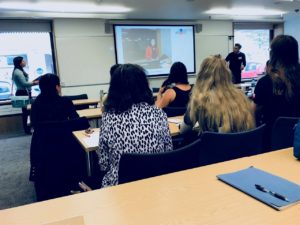 The main aim of the symposium was to bring scholars from various institutions and disciplines together in order to create a dialogue between them about their different perspectives on memory. To that end, the event was composed of two round table panels and a keynote lecture. In theround table sessions, each of the speakers gave a 5-minute micro-presentation on some insight or methodological point relating to their own research. After the presentations, the chair took questions from the audience and initiated discussions between panellists, seeking to draw out the connections and disconnects between the presentations and the perspectives on memory voiced in them.
The main aim of the symposium was to bring scholars from various institutions and disciplines together in order to create a dialogue between them about their different perspectives on memory. To that end, the event was composed of two round table panels and a keynote lecture. In theround table sessions, each of the speakers gave a 5-minute micro-presentation on some insight or methodological point relating to their own research. After the presentations, the chair took questions from the audience and initiated discussions between panellists, seeking to draw out the connections and disconnects between the presentations and the perspectives on memory voiced in them.
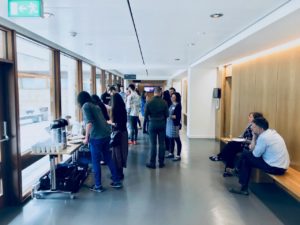 Delegates included scholars working in the fields of English literature, Chinese studies, French and Francophone studies, German studies, Spanish and Latin American studies as well as anthropology, history, heritage, sociology and political science. While most participants hailed from the humanities and social sciences, we also had delegates from disciplines including neuroscience, psychology and computer science. Attendees hailed from more than 15 different institutions across the UK. The Scottish universities of Edinburgh, Glasgow, Strathclyde, Stirling and St Andrews as well as Edinburgh Napier University and the University of the Highlands and Islands were all represented. Universities in the North of England were represented by attendees from Newcastle and York St John. Other speakers travelled from the universities of Cambridge, Cardiff and Brighton. Speakers included postgraduate students, ECRs and established academics.
Delegates included scholars working in the fields of English literature, Chinese studies, French and Francophone studies, German studies, Spanish and Latin American studies as well as anthropology, history, heritage, sociology and political science. While most participants hailed from the humanities and social sciences, we also had delegates from disciplines including neuroscience, psychology and computer science. Attendees hailed from more than 15 different institutions across the UK. The Scottish universities of Edinburgh, Glasgow, Strathclyde, Stirling and St Andrews as well as Edinburgh Napier University and the University of the Highlands and Islands were all represented. Universities in the North of England were represented by attendees from Newcastle and York St John. Other speakers travelled from the universities of Cambridge, Cardiff and Brighton. Speakers included postgraduate students, ECRs and established academics.
The symposium opened with a welcome speech by Paul Leworthy. In the round table sessions, we heard fascinating micro-presentations on a variety of subjects, all of which were admirably packed with information and insights despite the restrictive 5-minute time limit. Adeptly chaired by Dr Claire Boyle and Dr Simon Cooke (both University of Edinburgh) and propelled by incisive audience questions, the discussion sessions traced some of the connections and contradictions that obtain between different approaches to studying memory.
The role of spatial, social and cultural schemata was a key node around which contributions clustered, with interventions from scientists, social scientists and cultural critics each casting the others’ into sharper relief. The cultural framing of the past was considered in terms of narratives, nations and – often at the interface of the two – translations. Cautionary, critical and more optimistic positions were all defended as different forms of external memory resources were discussed. Positing memory as a present performance of the past, questions were asked on the one hand about the socio-political opportunities memory offers and on the other about the responsibilities it entails.
The day was rounded off by a captivating keynote lecture by Professor Andrew Hoskins (University of Glasgow) in which he drew on his research in digital memory studies to argue for a recalibration of the study of memory such that it affords adequate status to forgetting. The three main sessions were interspersed with opportunities for delegates to pursue conversations and enquiries sparked in the discussion sessions. Connections continued to be made in lively discussions during the drinks reception after the symposium.
Participants praised the format of the symposium and the breadth of the research perspectives it brought together. Delegates described how the event encouraged unexpected conversations and provided plenty of time and space for those talks to take place. The exposure the event offered to aspects of memory that individuals hadn’t encountered in the course of their own research was equally popular.
We are grateful to the University of Edinburgh School of Languages, Literatures and Cultures and especially to the Institute for Modern Languages Research for their generous support with this event.
***
Connecting Memories is a collaborative interdisciplinary research initiative opening up a space for previously unconnected scholars working on memory to interact, to share their perspectives and reflections on what memory means in the context of their research.
The Connecting Memories initiative is led by co-founders Paul Armstrong Leworthy and Bárbara Fernández Melleda. It is based in the School of Languages, Literatures and Cultures at the University of Edinburgh.
e: info@connectingmemories.org
f: https://www.facebook.com/connectingmemories
w: http://www.connectingmemories.org/
Paul Leworthy, University of Edinburgh
Liberty, Irreverence and the Place of Women in Early Modern Italian Culture: a one-day Symposium in Honour of Letizia Panizza
Simone Testa reports:
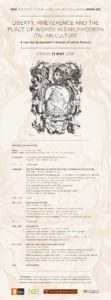 The event that took place at the Institute of Modern Languages Research, University of London, on 11 May 2018 celebrated a scholar whose research has always been marked by a strong multi-disciplinary character, Letizia Panizza. Participants from Europe, North America and Britain formed a very stimulating group of speakers and audience of three generations of scholars who were Letizia Panizza’s long-time friends and colleagues, and the first and second generation inspired by Panizza’s research interests.
The event that took place at the Institute of Modern Languages Research, University of London, on 11 May 2018 celebrated a scholar whose research has always been marked by a strong multi-disciplinary character, Letizia Panizza. Participants from Europe, North America and Britain formed a very stimulating group of speakers and audience of three generations of scholars who were Letizia Panizza’s long-time friends and colleagues, and the first and second generation inspired by Panizza’s research interests.
The image on the conference poster represents the emblem of one of the Academies dear to Letizia Panizza, the Incogniti of Venice. It shows a mountain and a river, possibly the river Nile, with the motto ‘ex ignoto, notus’ (known from the unknown). As organisers, we thought that this emblem was applicable also to Letizia Panizza’s scholarly mission, not only because of her interest in the group of writers known as the Incogniti. The emblem also describes Letizia’s approaches to research, her deep knowledge of and commitment to understanding the true meaning of texts, and the scholarly background that has characterised her contributions.
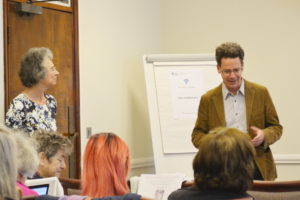 Jane Everson, a long-time colleague of Letizia Panizza, and Stefano Jossa, a senior lecturer at Royal Holloway, opened the day. Everson recounted when Panizza organised two very successful events almost single-handedly, one on Renaissance Women, and another on Libertines. Jossa paid tribute to Panizza’s generosity in also sharing her knowledge through convivial moments, very much in the footsteps of the classical tradition of which she is a renowned scholar.
Jane Everson, a long-time colleague of Letizia Panizza, and Stefano Jossa, a senior lecturer at Royal Holloway, opened the day. Everson recounted when Panizza organised two very successful events almost single-handedly, one on Renaissance Women, and another on Libertines. Jossa paid tribute to Panizza’s generosity in also sharing her knowledge through convivial moments, very much in the footsteps of the classical tradition of which she is a renowned scholar.
Letizia Panizza herself set the friendly and scholarly tone of the Symposium when she addressed Stephen Clucas, her former PhD student, just before he started his tribute, by saying: “Remember, Stephen, I know that an encomium is meant to be full of lies!” In his remarks, Clucas underlined the breadth and depth of Panizza’s contributions to scholarship: her early interests in Lorenzo Valla and humanism; the lives of Renaissance philosophers; and her groundbreaking commitment to give a voice to Early-Modern women. Within this very broad frame, Panizza has explored all sorts of discourses and literary genra: satire, poetry, political treatises, polemical arguments and philosophical debates.
The Space of Women in Early Modern Italy could take the shape of the intimacy of domestic piety (Abigail Brundin) or the literary efforts of a mother who wrote behavioural instructions to her daughter. As for spaces strictu sensu, Sandra Cavallo illustrated how the rooms of a palace, designed to host the family of Cardinal Spada in Rome, included spaces for women, which were surprisingly more subject to intrusion by males than male rooms, despite the narrative of the protection of women’s honour in those centuries.
The panel on poetry offered a variety of topics, spanning from Alison Brown’s new research on thus-far neglected poems by Piero de’ Medici the Unfortunate. Brown commented on the network of people surrounding Piero, including Poliziano, who was among the first readers of Piero’s poetry. Amelia Papworth explained the contradictory attitude of the poetess Laura Terracina towards a giant of Italian literature such as Ariosto. Still on Ariosto’s circulation, Ambra Anelotti illustrated the literary adaptation of the poet’s characters in the epistolary genre, in the decades between the end of the sixteenth century and middle of the seventeenth.
The roles of individuals were the focus of Unn Irene Aasdalene’s paper, which illustrated the way in which the part of the female protagonist Diotima, in Plato’s Symposium, was then used and refashioned in Ficino’s dialogue De amore. John Sellars argued that the fashion of writing philosophers’ lives in Renaissance culture matched the widespread fascination with conceiving philosophy as a way of life. Michael Allen closed the panel with reflections on Platonic ideas.
In the last panel, Marta Fattori illustrated a case study of censorship of Machiavelli in eighteenth-century Rome, where a Master of the Sacred Palace aptly defined the Florentine Secretary as an author of ambiguous faith, whose work either enthused readers or made them utterly condemn his theories. Dilwyn Knox referred to Panizza’s interest in Giordano Bruno and his Spaccio de la bestia trionfante, proposing that Bruno’s recurring maxim ‘Nature is God in Things’ was actually an expression of the coherence of his philosophy. Finally, there was a return to Panizza’s interest in the voices of Early Modern Italian women. Francesca Medioli discussed her own detailed historical research into Tarabotti’s life during the years between her taking the veil, and her connection with the prince of the Incogniti academy GiovanFrancesco Loredan.
Finally, Stephen Clucas thanked several people and institutions for their help at various stages in the organisation of the successful event emphasising the importance of Panizza’s contributions, and which attracted a large audience and saw lively debates at the end of each panel. Many thanks to the generous sponsorship of four institutions: the Society of Italian Studies; the Society for Renaissance Studies; The University of Cambridge; and Royal Holloway University of London.
Organisers: Simone Testa, Stephen Clucas, Stefano Jossa, Abigail Brundin, Susan Haskins and Chiara Bechis.
Simone Testa, International Studies Institute, Florence
British Academy plenary round table: Does Modern Languages have a disciplinary identity?
Naomi Wells reports on the British Academy plenary round table hosted at the ‘Uncommon Ground: Modern Languages and Cultures for the 21st Century’ conference held at Durham University on 16-18 April 2018
 Last month, Durham’s School of Modern Languages and Cultures hosted a conference aimed at addressing ‘the pressing ethical imperatives for the study of Modern Languages and Cultures as a diverse and yet coherent discipline in a world which is increasingly – and acrimoniously – divided’. The landmark conference was also intended to act as a platform for establishing a regular UK-based gathering of the Modern Languages research community to promote the productive exchange of ideas across language and subject boundaries. Central to the conference’s vision for the future direction of the discipline, as articulated by Durham’s Head of School Janet Stewart, was the idea not of promoting uniformity but rather of highlighting a commitment to recognising but not reifying disciplinary diversity.
Last month, Durham’s School of Modern Languages and Cultures hosted a conference aimed at addressing ‘the pressing ethical imperatives for the study of Modern Languages and Cultures as a diverse and yet coherent discipline in a world which is increasingly – and acrimoniously – divided’. The landmark conference was also intended to act as a platform for establishing a regular UK-based gathering of the Modern Languages research community to promote the productive exchange of ideas across language and subject boundaries. Central to the conference’s vision for the future direction of the discipline, as articulated by Durham’s Head of School Janet Stewart, was the idea not of promoting uniformity but rather of highlighting a commitment to recognising but not reifying disciplinary diversity.
The closing panel of the conference, sponsored by the British Academy and chaired by Nigel Vincent, addressed more directly the ongoing questions and debates surrounding the disciplinary identity of Modern Languages. Speakers were drawn from across languages and institutions to share their experiences and reflections on the definition of Modern Languages as a discipline. Neil Kenny (Oxford), Lead Fellow for Languages at the British Academy, opened the panel with his own working definition: ‘The study of languages and of their associated cultures and societies from simultaneously the inside and the outside’. Kenny foregrounded the interaction of the insider and outsider perspectives as central to our approach and analysis in Modern Languages, thus emphasising the importance of a heightened awareness both of our ‘embodied’ immersion in the languages we study and of our linguistic, cultural and/or geographical mooring in the UK.
Jonathan Long (Durham) equally emphasised the need for a broad and inclusive definition for Modern Languages, explaining how no discipline is required to agree on a single shared methodology or object of study. Instead, Long emphasised that what holds us together are the shared practices of knowledge exchange, for example through subject associations and conferences such as this. Paul Starkey (Durham) followed by offering distinct definitions of ‘a discipline’, contrasting the definition based on shared faculties, subject associations and journals, with the idea of a discipline as a form of authority imposed through rigorous training and potentially elements of ‘policing’ of disciplinary boundaries. Starkey also highlighted the Eurocentrism common to definitions of Modern Languages in the UK, with Arabic, his own language of specialisation, until recently located elsewhere in Oriental or Area Studies departments.
Michelle MacLeod (Aberdeen) drew attention to Gaelic and other Celtic languages which equally often lack prominence in Modern Languages discussions. MacLeod explained how the minoritised status of these languages had meant significant funds were now available for language policy related research, but this needed to be balanced in the curriculum with more traditional areas of study such as literature. Gerda Wielander (Westminster) also highlighted the connections between the study of Chinese and political priorities, clarifying the distinction between Area or China Studies, where the language was often considered marginal, and Chinese Studies, where language learning and knowledge is central.
Wielander highlighted differing institutional definitions of Modern Languages, drawing on her own experiences in a post-92 university setting. Despite these differences, she emphasised the value and importance of sharing resources and skills across Modern Languages, and of a shared disciplinary identity to guard against the threat of being easily subsumed under other disciplines. Closing the panel, Charles Forsdick echoed the importance of external visibility and internal credibility for Modern Languages as a discipline, drawing attention to the risk of performing our disciplinary diversity as fragmentation. He also stressed the importance of developing a stronger sense of our disciplinary history beyond a focus only on contemporary events, mentioning the 1918 Leathes Report and Nicola McLelland’s work on the history of Modern Languages teaching in the UK. Bringing us back to Kenny’s proposed definition, Forsdick drew on the work of Mary Louise Pratt to highlight that central to Modern Languages research and teaching is the idea of ‘knowing languages and knowing the world through language’.
In sum, while the panel offered very distinct perspectives from across a range of languages, experiences and institutions, there was a shared emphasis on the value of articulating and communicating our disciplinary identity. Equally, the breadth of subjects covered and productive discussions held across the plenary sessions and panels I attended over the three days of the conference served to highlight the vibrancy and value of the work and debates which take place in the ‘uncommon ground’ across which Modern Languages scholars teach and research.
Naomi Wells, Post-Doctoral Research Associate (Translingual Communities, European Languages and Digital Humanities), IMLR
.

